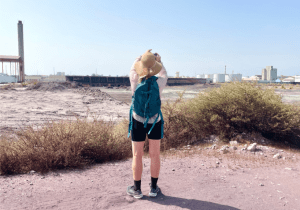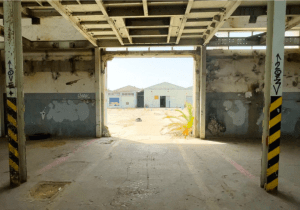Floriana Mitchell, Anthropology student, spent a two months with Pada Studios in Portugal funded by the Turing Scheme.
The first step in finding my placement included reflecting on what kind of experience I wanted to have and what skills I would like to achieve. Thus, I decided to find an independent non-profit art space to experience how an independent art organisation is run whilst building connections with like-minded people in an international setting. I found an artist-run International Art Residency programme in Portugal through this site. I applied, completed the interview, and got an offer to spend a few months with them as an Art Residency Assistant.
During this period, I met many artists and creatives from all over the world. I got to know their art practices and processes of thinking, which was incredibly fulfilling, besides the benefit of reflecting on my own art practice and future perspectives. My job involved
 different aspects of the programme including working with artists and assisting with opening receptions, as well as administrative duties. I also welcomed and interacted with the public, helped with exhibitions and photo documentation, and even researching funding. This experience gave me a comprehensive and detailed perception of how the space is managed and the residency is organised.
different aspects of the programme including working with artists and assisting with opening receptions, as well as administrative duties. I also welcomed and interacted with the public, helped with exhibitions and photo documentation, and even researching funding. This experience gave me a comprehensive and detailed perception of how the space is managed and the residency is organised.
My duties changed depending on which task I was focusing on; I had to prioritise these by what needed to be done more urgently. I had long-term admin projects and ongoing practical aspects to pay attention to. These were mainly based on building relationships, supporting artists, photo documentation, and assisting the curators. Every day was different depending on the point of the residency cycle we were in. The environment was international and dynamic which made my experience broad and full of cultural contaminations.
Before moving, I had a bit of anxiety about finding a house and around the language barrier. Therefore, I joined groups online to find rooms for rent and texted all the people I knew could have any contacts in Portugal. I also asked people from the residency about accommodation since they are locals and would know more people in the area.
Through contacts of contacts, I found accommodation quite easily. So, after just a few days of being there, the sense of anxiety dissipated. I reckon it is normal to feel anxious whenever there is a change to routine especially going into the unknown. However, it is also what makes the experience compelling and valuable.
The unknown allows me to explore and discover aspects of myself and my reality that cannot emerge in a familiar environment.
What I enjoyed the most was the connection with people and sharing points of views and opinions with people from all over the world with shared interests. Moreover, I gained a more functional way of organising, prioritising, and making decisions. I feel I have a better understanding of my future. Consequently, I have a better ability to focus and direct my actions on a personal and professional level.
I highly recommend going abroad to every student. It is a fun and formative experience; it is not comparable with anything that can be done on campus. It is a positive challenge that helps promote growth in unexpected directions. It can feel dauting because you feel like you are alone in a foreign place, but it is great to learn new things about yourself by allowing yourself to feel this way. My main tip is to understand what your main anxieties and fears are and find a few anchors to help you feel more secure. Connect with people, ask for help, and let yourself be involved in the new reality.